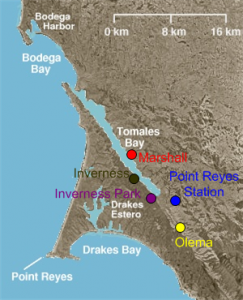Lawsuit opposes excessive Coastal Commission restrictions
By Dave Roberts
One of the reasons many California businesses are struggling to survive or are leaving the state is over-regulation by the state’s vast bureaucracy. While much of the economic devastation can be quantified, one of the more elusive pieces of data is the number of businesses that never get started due to onerous regulations. A case in point is the former Marshall Tavern on Tomales Bay in Marin County, which the new owners want to turn into a bed-and-breakfast inn.
In 1870, the Marshall Brothers built a hotel on the site, the first commercial structure in the town of Marshall. It served tourists and boaters until it burned down in 1971, leaving only the pilings that supported the hotel where it extended over the water. In 1873, the Marshalls built next to the hotel a hardware store and soda shop, which eventually morphed into a tavern.
For a while in the early 1970s the tavern, under the ownership of John Vertigan, turned into a happening place, featuring musicians such as Neil Young, Mimi Farina, Joan Baez and Van Morrison.
“The tavern became this great unifier of all the West Marin folks — ranchers, artists, latter-day hippies,” said Gary Giacomini, a former county supervisor, according to Vertigan’s obituary. “The focus was camaraderie and fun. I loved it for that.” Vertigan told a reporter in 1999, “It was a magical time. Musicians really liked playing there…. We couldn’t pay them much, but we gave them everything we could.”
He sold the tavern in 1976. It eventually fell into disrepair, shut down in 1990 and was condemned by Marin County in 1992. Since then it has become an eyesore or curiosity for passing motorists on Highway 1 and boaters on Tomales Bay.
In 2004, Daniel Altman and Avi Atid paid $510,000 for the two tidelands parcels containing the tavern building, a dilapidated shack, rundown pier and the site of the former hotel. For the past nine years they have been planning to renovate the tavern building, converting it into a six-unit bed-and-breakfast inn. In 2010 they were granted approval for their plans from the Marin County zoning administrator.
‘A wonderful project’
“It’s a wonderful project,” the zoning official said, according to the San Jose Mercury News. “I think the county and the community want to see it happen.” The staff report was also supportive: “The Marshall Tavern project represents an acceptable adaptive reuse for a historically important building.”
And residents in the area are also looking forward to the building’s restoration. Comments after a recent Marin Independent Journal article on the restoration plan included:
“Let’s hope this works out at last, and that the developers have good taste and a sensitivity for our vernacular historic buildings!”
“I hope the new owners are successful. I have stopped and looked at that building many times. Such a waste of a great location… until now.”
“Great to rebuild these historic buildings lest we forget how we got here.”
“Used to play music there. Great place, didn’t know it fell on hard times…”
“Yes! I loved that place. This is great to see.”
But there’s a chance the renovation won’t happen and the building will continue rotting away until it collapses. The California Coastal Commission has imposed conditions on its restoration that are so restrictive and expensive that Altman and Atid may cancel the project altogether.
“The commission’s costly demands aren’t just unfair. They will make our plans for renovating and reopening the Marshall Tavern financially impractical,” said Altman. “We might even have to sell the property. This is a tragic development because we want to make a beautiful, vibrant addition to the area’s historic district, and the commission’s demands will make it impossible for us to do so.”
The commission’s conditions require the construction of a large public pier, the dedication of a five-foot-wide strip for 24-hour public access (passing directly under guests’ windows), the removal of the old hotel pilings (potentially costing more than $100,000) and a use restriction that could prevent future development of the old hotel property.
Coastal Act issues
The Coastal Commission cited the Coastal Act as justification for these conditions, which were imposed at its Dec. 13, 2012 meeting. Laurel Kellner, a staff analyst, told the commission:
“In general the proposed project represents a Coastal Act priority visitor serving use that would provide new visitor opportunities and enhance the public’s ability to enjoy a picturesque part of the Tomales Bay shoreline. Located over the water, it provides a unique setting for a small-scale overnight facility.
“However, these same attributes raise Coastal Act issues. The expanded pilings represent a form of wetland fill not allowed for this type of use and result in marine resource impacts. The site is subject to a public trust easement. Public recreational access to the site is not protected nor maximized. The project will modify and increase massing of a significant public view out toward Tomales Bay. The site is subject to shoreline flooding and other hazards. It will require shoreline-altering retaining walls and piers to provide protection from such hazards. As a result, the project cannot be found consistent with the Coastal Act.
“However, consistent with the mandate of the Coastal Act section 30010, and since any economic use of the property would necessitate fill of Tomales Bay, staff recommends approval of the bed-and-breakfast in order to provide for a reasonable use of the property that will avoid an unconstitutional taking of private property for public use. Staff recommends special conditions necessary to find the proposed development consistent with the otherwise applicable policies of the Coastal Act, including the public access and recreation policies. And to recognize that, although the applicant owns title to the subject tidelands, such tidelands are protected by a public trust easement.”
Altman pleaded with the commission to remove some of the conditions. Public access will be provided with the pier, so he doesn’t see the need also to provide access under the guest windows. He also doesn’t want to remove the old hotel pilings, which he wants to use for a future project, perhaps another bed-and-breakfast. And he objected to the requirement to remove a fence, saying it’s there for public safety.
Pleas for leniency
Atid also pleaded for leniency, saying, “This has been with the Coastal Commission for more than two years. We have been trying very hard to find something that would work. It took us almost two years to get the use permit from the county.”
He also objected to the public access requirement, noting that it would be along the building’s highway frontage. “It’s important to have some sense of privacy because this is very exposed, it’s very close to the freeway,” said Atid. “And to have a public access right there we think is dangerous.”
Kellner defended the restrictions, saying that “although the owners have title to the underlying property, the state retains a public trust easement over the lands. And this easement is for public uses, including public recreational uses. The public trust easement that applies here is a fundamental component, which informed the staff recommendation, including the conditions that are now being challenged by the applicants.”
The commission, as commissions usually do, sided with its staff.
“We have a significant opportunity for public access coming out of this,” said Steve Kinsey, a commissioner who also represents much of the Marin coast on the Marin Board of Supervisors. “While at the same time the applicant gets the opportunity to reconstruct a slowly dying building before it goes completely back into the bay. I personally believe that this is an example of the best of what we can get through the Coastal Act, which will restore the historic character of part of our legacy on the Tomales Bay. But also provide a return of public access into the bay with the public pier.”
The commission then unanimously approved the project, subject to the conditions in the 74-page staff report.
PLF files lawsuit
Altman and Atid, with the help of the Pacific Legal Foundation, have decided to sue the Coastal Commission, challenging the public access requirement, the piling removal and the use restriction. The lawsuit bases the challenge on a 1987 case that PLF successfully won in the Supreme Court: Nollan v. California Coastal Commission.
That case “struck down an attempt by the Coastal Commission to condition a building permit on the dedication of a public-access easement,” according to the PLF. “The Court held that imposing a condition that has no connection to the impacts of the project is unconstitutional, and nothing but an ‘out-and-out plan of extortion.’ The restoration of the Marshall Tavern will not interfere with public access and is unrelated to the presence of the pilings on, and future use of, the neighboring parcel. Altman and Atid’s case demonstrates that the Coastal Commission has still not learned the lesson of Nollan.”
PLF attorney Jonathan Wood said, “The Coastal Commission is up to its old tricks, using the permitting process to make extortionate demands on property owners. If the Commission wants property owners to give up their property rights, it should pay for them. It cannot use the permitting power to evade the constitutional duty to provide compensation. But the commission has difficulty respecting constitutionally guaranteed property rights, so once again it has to be taken to court.”
PLF expects the case to be heard in Marin Superior Court toward the end of the year.
Related Articles
Brazil anti-govt. protests spreading
June 22, 2013 By John Seiler I noted earlier that anti-government protests have erupted in Brazil against their crummy government.
CA Legislature may restore internet privacy rights rolled back by Washington
The California Legislature is considering effectively restoring internet privacy regulations in America’s largest state that were adopted for the entire
Legislation would create school marshal program to protect kids
Jan. 31, 2013 By Katy Grimes SACRAMENTO — Planes have armed air marshals. How about armed school marshals? Last week





